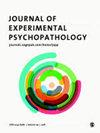歧义情境下解释偏倚对抑郁的影响:一项间隔三个月的小组调查
IF 1.9
4区 医学
Q4 PSYCHIATRY
引用次数: 1
摘要
对模棱两可情境的消极解读被理解为解读偏差,是导致和延长抑郁症的核心因素。然而,很少有研究调查解释偏差对抑郁症的因果影响。因此,我们开发了日本版的AST-D-II,其中使用模糊情景来测量与抑郁相关的解释偏差。在两个时间点(时间1和时间2)对247名参与者进行了调查,间隔为3个月。随后,验证了日文版AST-D-II的信度和效度。然后,将两个时间点的抑郁和AST-D-II评分纳入结构方程模型,并检验交叉滞后面板模型。虽然日本版AST-D-Ⅱ的因子结构与以往研究中发现的不同,但它是衡量日本人解释偏差的有用量表。此外,交叉滞后面板模型显示,解释偏差不仅与当前抑郁有关,而且时间1的解释偏差对时间2的抑郁也有影响。因此,我们可以推断,解释偏见对抑郁有长期影响,这表明干预解释偏见在预防抑郁中很重要。本文章由计算机程序翻译,如有差异,请以英文原文为准。
Impact of interpretation bias on depression in ambiguous situations: A panel survey with a three-month interval
The negative interpretation of ambiguous situations is understood as interpretation bias, which is a core factor that causes and prolongs depression. However, not many studies have examined the causal influence of interpretation bias on depression. Accordingly, we developed the Japanese version of AST-D-II in which ambiguous scenarios are employed to measure interpretation bias related to depression. A survey was conducted among 247 participants at two time points, with a three-month interval (Time 1 and Time 2). Subsequently, the reliability and validity of the Japanese version of AST-D-II were verified. Thereafter, the depression and AST-D-II scores at both time points were put into structural equation modeling and the cross-lagged panel model was examined. Although the Japanese version of AST-D-Ⅱ had a different factor structure to that found in previous studies, it is a useful scale to measure interpretation bias in Japanese people. In addition, the cross-lagged panel model revealed that interpretation bias is not only related to current depression, but interpretation bias at Time 1 has an impact on depression at Time 2. Therefore, one may deduce that interpretation bias has a long-term impact on depression, thus indicating that interventions on interpretation bias are important in the prevention of depression.
求助全文
通过发布文献求助,成功后即可免费获取论文全文。
去求助
来源期刊

Journal of Experimental Psychopathology
Medicine-Psychiatry and Mental Health
CiteScore
2.00
自引率
0.00%
发文量
19
审稿时长
11 weeks
期刊介绍:
The Journal of Experimental Psychopathology (EPP) is an open access, peer reviewed, journal focused on publishing cutting-edge original contributions to scientific knowledge in the general area of psychopathology. Although there will be an emphasis on publishing research which has adopted an experimental approach to describing and understanding psychopathology, the journal will also welcome submissions that make significant contributions to knowledge using other empirical methods such as correlational designs, meta-analyses, epidemiological and prospective approaches, and single-case experiments.
 求助内容:
求助内容: 应助结果提醒方式:
应助结果提醒方式:


